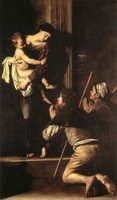This is a continuation of the 73 Steps to Spiritual Communion with God by Michael Dubruiel. The previous posts are below and in the archives to the right. This is the 37th step part 2:
(37) Not to be drowsy.
Monks get up at 4 A.M. every morning. Most of us do not but sleep is essential for all of us. St. Benedict's counsel reflects the rigors of monastic life but applies to us as well. We need sleep in order to give our full attention to life's demands.
(37) Not to be drowsy.
Monks get up at 4 A.M. every morning. Most of us do not but sleep is essential for all of us. St. Benedict's counsel reflects the rigors of monastic life but applies to us as well. We need sleep in order to give our full attention to life's demands.
There also is the memory of the Apostles and their failure to stay awake at the crucial moments of Our Lord's agony, "And he came and found them sleeping," (Mark 14:37). And of course the warning that he is coming again and how will Our Lord find us, "Watch therefore-for you do not know when the master of the house will come, in the evening, or at midnight, or at cockcrow, or in the morning-lest he come suddenly and find you asleep. And what I say to you I say to all: Watch," (Mark 13:35).









